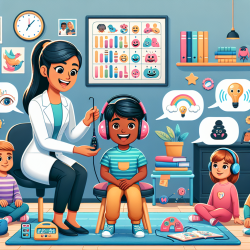Introduction
The COVID-19 pandemic has forced many healthcare providers to rethink their treatment delivery methods, particularly in the field of mental health. One such adaptation is the remote delivery of Enhanced Cognitive Behaviour Therapy (CBT-E), an evidence-based treatment for eating disorders. The research article "Challenges and opportunities for enhanced cognitive behaviour therapy (CBT-E) in light of COVID-19" provides valuable insights into how practitioners can adapt CBT-E for teletherapy, ensuring continuity of care for patients during these challenging times.
Remote Delivery of CBT-E: Suitability and Advantages
CBT-E is inherently suitable for remote delivery due to its focus on verbal communication, which can be effectively maintained through video calls. This mode of delivery offers several advantages:
- Convenience and reduced disruption to patients' lives.
- Potentially lower costs and increased accessibility.
- Opportunities for patients to build self-efficacy as they attribute progress to their own efforts rather than solely to the therapist.
Research supports the effectiveness of remote CBT-E, showing similar outcomes to face-to-face therapy, particularly when the therapeutic alliance is strong.
Challenges and Solutions in Remote CBT-E
Despite its suitability, remote CBT-E presents unique challenges:
- Maintaining confidentiality and security during sessions.
- Overcoming technical barriers and ensuring both therapist and patient are comfortable with the technology.
- Building and maintaining a therapeutic alliance without initial face-to-face contact.
These challenges can be mitigated by choosing appropriate video platforms, ensuring secure communication, and fostering a collaborative relationship through clear communication and empathy.
Adapting CBT-E for COVID-19 Challenges
The pandemic has introduced new stressors that can exacerbate eating disorders, such as social isolation and anxiety about infection. CBT-E can be adapted to address these issues by:
- Focusing on regular eating patterns despite changes in daily routines.
- Encouraging flexibility in dietary rules due to potential food shortages.
- Utilizing virtual social interactions to reduce feelings of isolation.
Therapists should also be mindful of the increased potential for body checking during video calls and work with patients to develop healthier coping mechanisms.
Guidelines for Practitioners
Practitioners looking to implement remote CBT-E should consider the following guidelines:
- Conduct thorough assessments to determine the suitability of remote therapy for each patient.
- Use standardized measures like the EDE-Q and CIA to monitor progress.
- Adapt session structures to include discussions about the patient's attitude towards remote therapy.
- Provide clear instructions for self-monitoring and collaborative weighing.
Conclusion
The shift to remote CBT-E during the COVID-19 pandemic presents both challenges and opportunities. By adapting therapy practices to the current circumstances, practitioners can continue to provide effective treatment for eating disorders. This adaptation not only ensures continuity of care but also opens the door to future innovations in teletherapy.
To read the original research paper, please follow this link: Challenges and opportunities for enhanced cognitive behaviour therapy (CBT-E) in light of COVID-19.










